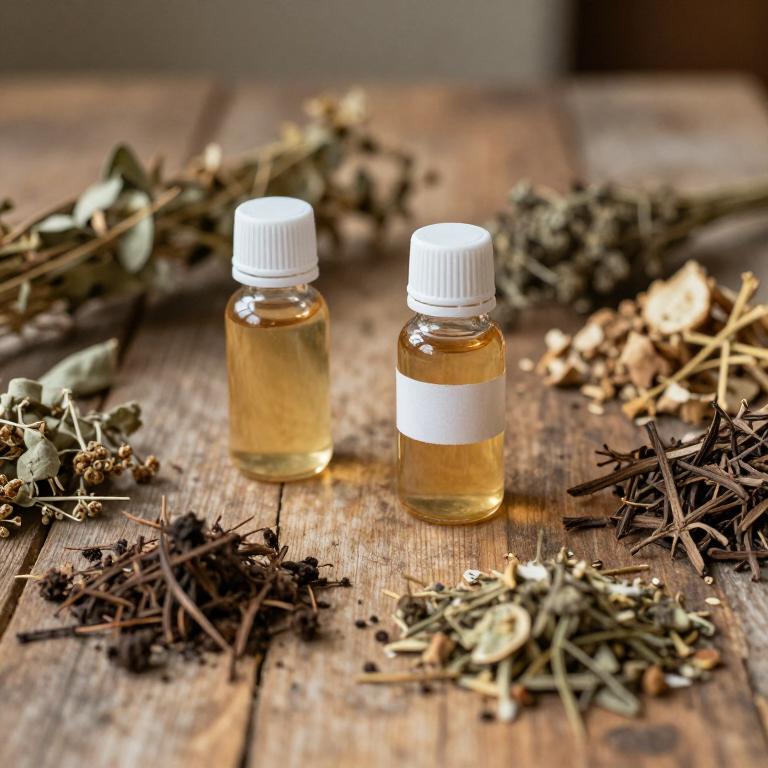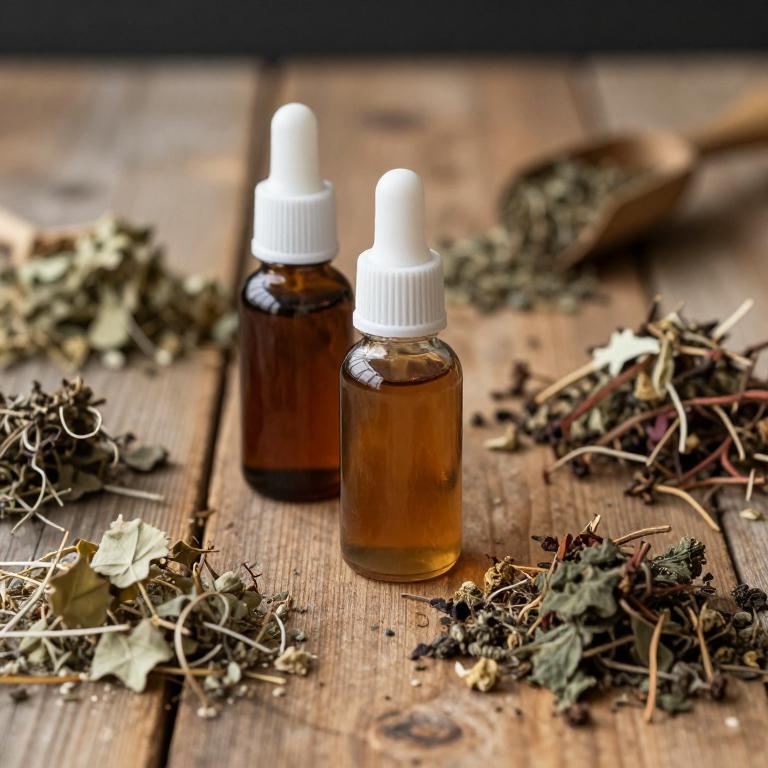10 Best Herbal Linctuses For Phlegm

Herbal linctuses are traditional remedies used to help alleviate symptoms of excessive phlegm by soothing the throat and reducing mucus production.
These preparations often contain natural ingredients such as thyme, eucalyptus, ginger, and licorice root, which are known for their expectorant and antiseptic properties. They are typically formulated as syrups or lozenges that can be easily administered to children and adults alike. Herbal linctuses are generally considered safe when used as directed, though they may interact with certain medications or have side effects in individuals with allergies.
They are often preferred over synthetic alternatives due to their gentler nature and potential for fewer side effects.
Table of Contents
- 1. Thyme (Thymus vulgaris)
- 2. Peppermint (Mentha piperita)
- 3. Fennel (Foeniculum vulgare)
- 4. Eucalyptus (Eucalyptus globulus)
- 5. Scots pine (Pinus sylvestris)
- 6. Licorice (Glycyrrhiza glabra)
- 7. Ginger (Zingiber officinale)
- 8. Ceylon cinnamon (Cinnamomum verum)
- 9. Anise (Pimpinella anisum)
- 10. Salvia (Salvia officinalis)
1. Thyme (Thymus vulgaris)

Thymus vulgaris, commonly known as thyme, is a popular herb used in the preparation of herbal linctuses for the relief of phlegm-related symptoms.
These linctuses are typically made by extracting the essential oils and active compounds from fresh or dried thyme leaves, which contain potent antimicrobial and expectorant properties. The warming and soothing effects of thyme help to loosen mucus in the respiratory tract, making it easier to expel. Thyme linctuses are often recommended for individuals suffering from bronchitis, coughs, or congestion due to their ability to reduce inflammation and promote clearer breathing.
When used as directed, thyme-based linctuses can provide natural and effective relief from excess phlegm and associated discomfort.
2. Peppermint (Mentha piperita)

Mentha piperita, commonly known as peppermint, is often used in herbal linctuses to help alleviate symptoms associated with phlegm and respiratory congestion.
These linctuses typically combine the soothing and expectorant properties of peppermint oil with other natural ingredients to promote easier mucus expulsion. The menthol in peppermint acts as a mild decongestant, helping to clear the airways and reduce the thickness of phlegm. Herbal linctuses containing mentha piperita are generally considered safe for adults and may offer a natural alternative to conventional over-the-counter remedies.
However, they should be used as directed and may not be suitable for children or individuals with certain medical conditions.
3. Fennel (Foeniculum vulgare)

Foeniculum vulgare, commonly known as fennel, is often used in herbal linctuses to help alleviate symptoms of phlegm and respiratory congestion.
The essential oils found in fennel, particularly anethol and limonene, possess expectorant and antispasmodic properties that can loosen mucus and ease coughing. These herbal linctuses are typically prepared by combining dried fennel seeds with honey or other natural sweeteners to create a soothing and palatable remedy. They are particularly beneficial for children and adults suffering from bronchitis, colds, or other respiratory conditions characterized by excess mucus.
Due to its gentle nature, fennel linctus is considered a safe and effective alternative to conventional cough medications in many traditional and holistic medical practices.
4. Eucalyptus (Eucalyptus globulus)

Eucalyptus globulus, commonly known as eucalyptus, is a key ingredient in many herbal linctuses designed to help alleviate symptoms of excess phlegm.
These linctuses typically contain eucalyptus oil, which has expectorant properties that help loosen mucus and promote its expulsion from the respiratory tract. The aromatic compounds in eucalyptus can also provide a soothing effect, easing congestion and improving breathing. Often used as a natural alternative to over-the-counter medications, these herbal linctuses are favored for their mild side effect profile and potential therapeutic benefits.
They are particularly effective for individuals seeking relief from mild to moderate coughs and respiratory discomfort without the use of synthetic drugs.
5. Scots pine (Pinus sylvestris)

Pinus sylvestris, commonly known as Scots pine, has been traditionally used in herbal medicine for its expectorant properties, particularly in the form of linctuses to help manage phlegm.
The essential oils extracted from the needles of this conifer contain compounds such as pinene and camphor, which are believed to stimulate the respiratory tract and ease mucus congestion. These linctuses are often prepared by infusing the dried needles in oil or alcohol, creating a potent remedy for coughs and respiratory discomfort. Due to their ability to loosen and expel phlegm, Pinus sylvestris linctuses are frequently recommended for individuals suffering from bronchitis or other respiratory infections.
However, it is important to consult a healthcare professional before using these herbal remedies, especially for prolonged periods or in combination with other medications.
6. Licorice (Glycyrrhiza glabra)

Glycyrrhiza glabra, commonly known as licorice, has been traditionally used in herbal medicine for its expectorant and anti-inflammatory properties, making it a key ingredient in linctuses for alleviating phlegm-related respiratory symptoms.
The active compound, glycyrrhizin, helps to loosen mucus and reduce inflammation in the airways, thereby easing coughing and improving breathing. Licorice-based linctuses are often formulated with other herbs like thyme or eucalyptus to enhance their effectiveness in clearing congestion. These natural remedies are particularly beneficial for individuals seeking alternatives to conventional cough suppressants.
However, long-term use of licorice may lead to side effects such as hypertension and water retention, so it should be used under the guidance of a healthcare professional.
7. Ginger (Zingiber officinale)

Zingiber officinale, commonly known as ginger, has been traditionally used in herbal remedies to help alleviate symptoms associated with phlegm and respiratory congestion.
Ginger linctuses, which are medicinal syrups or liquid formulations, often contain extracts of fresh or dried ginger root, known for their warming and expectorant properties. These herbal linctuses are believed to help loosen mucus in the airways, making it easier to cough up phlegm and reduce throat irritation. They are typically used as a natural alternative or complement to conventional cough medications, especially for those seeking non-pharmaceutical treatments.
However, it is important to consult with a healthcare professional before using ginger linctuses, particularly for individuals with underlying health conditions or those taking other medications.
8. Ceylon cinnamon (Cinnamomum verum)

Cinnamomum verum, commonly known as true cinnamon, has been traditionally used in herbal remedies for its expectorant and antispasmodic properties.
When incorporated into linctuses, or herbal cough syrups, cinnamon can help loosen and expel phlegm from the respiratory tract, making it easier to cough up. The essential oils in cinnamon, such as cinnamaldehyde, possess anti-inflammatory and antimicrobial effects that may reduce irritation and infection in the airways. However, while cinnamon-based linctuses may offer some symptomatic relief, they should not replace conventional medical treatment for persistent or severe respiratory conditions.
It is important to consult a healthcare provider before using cinnamon linctuses, especially for children or individuals with allergies or existing health conditions.
9. Anise (Pimpinella anisum)

Pimpinella anisum, commonly known as anise, is a herb often used in the formulation of herbal linctuses to help alleviate symptoms associated with phlegm and respiratory discomfort.
These linctuses typically contain anise oil, which is known for its expectorant properties that help loosen mucus in the airways, making it easier to expel. The aromatic compounds in anise, such as anethol, also have a soothing effect on the throat and may help reduce coughing. Herbal linctuses made with anise are often preferred by individuals seeking natural remedies for congestion and productive coughs.
However, they should be used as part of a broader treatment plan and under the guidance of a healthcare professional, especially for persistent or severe respiratory conditions.
10. Salvia (Salvia officinalis)

Salvia officinalis, commonly known as sage, has been traditionally used in herbal medicine to create linctuses for the relief of phlegm-related symptoms.
These herbal linctuses often combine sage extract with honey or other natural sweeteners to enhance flavor and soothe the throat. Sage is believed to possess expectorant properties that help loosen mucus and facilitate its expulsion from the respiratory tract. The anti-inflammatory and antimicrobial effects of sage may also contribute to reducing irritation and infection in the throat.
As a natural remedy, sage-based linctuses are often preferred by individuals seeking alternative or complementary treatments for coughs and excess phlegm.